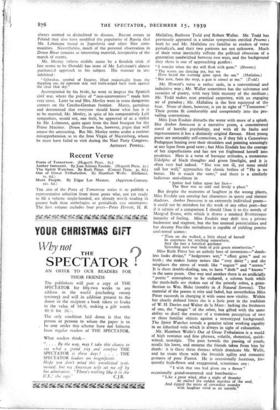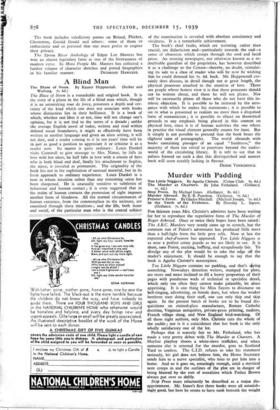Recent Verse
More People. By Edgar Lee Masters. (Appleton-Century. los. 6d.)
THE aim of the Poets of Tomorrow series is to publish a representative selection from those poets who, not yet ready to fill a volume single-handed, are already worth reading in greater bulk than anthologies or periodicals can encompass. The first volume includes four poets—Peter Hewett, H. B. Mallalieu, Ruthven Todd and Robert Waller. Mr. Todd has previously appeared in a similar symposium entitled Proems; both he and Mr. Mallalieu are familiar to readers of verse periodicals, and their two partners are not unknown. Much
of their verse inevitably reflects the political obsession of a generation sandwiched between two wars, and the background they share is one of approaching gunfire: " I wonder when the sky will flash with guns." (Hewett.) " The waves are dancing yet, but we Have heard the warning guns upon the sea." (Mallalieu.) " But now, from the map, a gun is aimed at me." (Tcdd.) Mr. Hewett's verse is rather stale, in a conventional and indecisive way ; Mr. Waller sometimes has the substance and occasion of poetry, with very little mastery of the medium ; Mr. Todd makes neat practical carpentry, with an engaging air of paradox ; Mr. Mallalieu is the best equipped of the four. None of them, however, is yet in sight of " Tomorrow."
Their poems fit comfortably and competently into the pre- vailing conventions.
Miss Joan Easdale disturbs the water with more of a splash. Her Amber Innocent is a narrative poem, a concentrated novel of horrific psychology, and with all its faults and
ingenuousness it has a distinctly original flavour. Most young poets are noticeably self-conscious, as if they felt a Censorious Pedagogue leaning over their shoulders and pointing accusingly at any lapse from good taste ; but Miss Easdale has the courage of her imperfections and has not yet frightened herself into prudence. Hers is a verse of baroque attitudes, a monstrous
Udolpho of black thoughts and green limelight, and it is often very bad indeed. " She was not ill, yet none could call her well," approaches the classic bathos of "He is no better. He is much the same," and there is a similarly ludicrous anti-climax in " Amber had fallen upon her face—
The floor was so cold and lovely a place."
But despite the moments of laughter in the wrong places,
Miss Easdale can envelop her characters in queer and sinister shadows. Amber Innocent is an extremely individual poem—
it could not be mistaken for the work of any other poet—but if it admits of a comparison I should liken it to the novels of Margiad Evans, with which it shares a strained Bronteesque intensity of feeling. Miss Easdale may drift into a private backwater and stagnate, but she has unusual potentialities and her dreamy Poe-like melodrama is capable of yielding precise cool-toned scenes : " Then on she walked, a little ahead of herself In eagerness for reaching somewhere, And she met a fanatical gardener Spreading nets over beds of pale green strawberries."
Miss Ruth Pitter has an unholy love of inversions—" death- less looks divine," " hedgerows wet," " effort grim " and so forth ; she makes funny noises like " rosy daisy " ; and she misplaces the stress of words like "august" and "access." It is sheer double-dealing, too, to have " doth " and " knows " in the same poem. One way and another there is an artificially " poetic " atmosphere to be endured, a solemn hush while
the moth-balls are shaken out of the priestly robes, a. genu- flection to Wm. Blake (notably in A Natural Sorrow). The material of the poems is trite and faded, but nevertheless Miss Pitter succeeds in charging it with some new vitality. Within her clearly defined limits she is a lyric poet in the tradition of W. H. Davies and Walter de la Mare: lacking the freshness
of one, the " magic " of the other, but gifted with the same ability to distil the essence of a transient perception of two
or three familiar objects against a stereotyped background. The Spirit Watches reveals a genuine talent working capably in an inherited vein which is always in sight of exhaustion.
Mr. Humbert Wolfe's Out of (great Tribulation is a world of high romance and fine phrases, volatile, rhetorical, quick- witted, nostalgic. The poet bewails the passing of youth, recalls his loves, and mourns the friends taken from him by death : it is these three themes which dominate Mr. Wolfe, and he treats them with the feverish agility and romantic
gestures of poor Pierrot. He is occasionally facetious, fre- quently high-flown and exaggerated, sometimes coy : " I wish that you had given me a flower " occasionally grand-mannered and bombastic- " Like a great wind, after a night of thunder he rocked the sodden marshes of the soul. And ripped the mists of cowardice asunder with laughter vivid as an aureole." The book includes valedictory poems on Briand, Flecker, Chesterton, Gerald Gould and others; some of them so enthusiastic and so personal that one must prefer to respect their privacy.
The Spoon River Anthology of Edgar Lee Masters has won an almost legendary fame as one of the forerunners of modern verse. In More People Mr. Masters has collected a further volume of character sketches and potted biographies









































 Previous page
Previous page